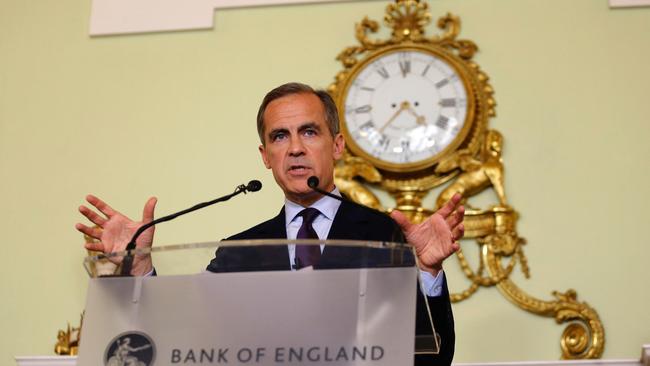Bank of England reacts to Brexit by lowering capital provisions
The Bank of England has taken steps to shore up the British economy following the surprise decision to exit the EU.

The Bank of England took steps last night to shore up the British economy following the surprise decision to exit the European Union, warning the outlook for the stability of the financial system had become “challenging”.
The BoE’s financial policy committee said it agreed to lower capital requirements for British banks in a move that should allow them to lend an extra £150 billion ($260bn) to British businesses and households to keep the economy flush with credit.
“There is evidence that some risks have begun to crystallise,” the committee said.
The pound fell to a new 31-year low on the central bank’s move, falling to $US1.3131, having earlier slipped below $US1.3121, the previous three-decade low it hit following the shock result of the British referendum.
In a news conference, Bank of England governor Mark Carney said the central bank “will take whatever action needed to support stability”.
The decision to reduce the so-called countercyclical capital buffer to zero reversed a decision to raise it taken in March. It said the buffer, an extra tier of equity designed to be reduced in a downturn, would stay at zero at least until June next year.
“This action reinforces the FPC’s view that all elements of the substantial capital and liquidity buffers that have been built up by banks are to be drawn on, as necessary,” the committee said in a statement accompanying its biannual financial stability report.
The BoE said it “strongly expects” banks to support the economy with fresh loans after the Brexit vote.
The BoE’s decision marks one of the first instances of a major central bank deliberately lowering bank capital requirements to maintain growth in credit to offset an economic shock. Lower capital requirements allow banks to finance loans and other assets with more borrowing and less equity.
The bank’s move will be closely watched as a test case of the new “macroprudential” regulatory regime adopted in Britain and other advanced economies after the financial crisis. The BoE gained broad new powers over the financial system and an explicit goal of safeguarding financial stability. It has spent the past few years bolstering lenders’ financial strength.
Officials warned the stability of the British financial system faced multiple threats after the Brexit vote. The BoE said it had already detected signs in stockmarkets and commercial real estate markets that foreign investors were pulling money out of Britain. A real estate fund managed by Standard Life Investments suspended withdrawals following a spate of redemption requests.
The BoE said some overstretched households might struggle to service their debts if the economy lurched downward. And officials warned that the outlook for the global economy had darkened.
Still, officials stressed the financial system was stronger now than it was in 2008 and 2009, when British taxpayers had to bail out stricken lenders and credit dried up. They also flagged that banks had parked collateral with the BoE sufficient to access more than £250bn of funding if they needed it.
The move on bank capital came ahead of expected interest rate cuts this summer. Economists also expect the central bank will revive a bond-buying program that had been on hold since 2012.



To join the conversation, please log in. Don't have an account? Register
Join the conversation, you are commenting as Logout